

What does the #coronavirus crisis mean for #FinTech? Someone asked me what the coronavirus pandemic means for the future of FinTech.

I’ve blogged a bit about that already, referring specifically to this great presentation by Finch Capital: But equally, you may think that times are dull and boring, locked in at home and nothing going on, but there’s loads happening. Critically, what’s happening is pivoting and switching strategies to deal with the new world. Some are acting fast to respond to customer needs, like Chime who offered to get government benefits direct to citizen via an app; or Railsbank who created Lightning Aid to get support to people direct during the crisis. Then there are the major deals that have been struck, such as Stripe’s new $600 million funding round, which values the firm at $36 billion, up $1 billion on the last valuation in September 2019. So, things aren’t that quiet. However, there have been some hits, and I wonder what will happen to those FinTech start-ups that were just reaching a funding round.
Capitalism done right: a co-operative system to solve human problems. Basic Income Recipients Spent the Money on “Literal Necessities” A popular argument levied by opponents of universal basic income (UBI) — an unconditional, periodic payment given to all members of a society — is that recipients will use the money on frivolous purchases.
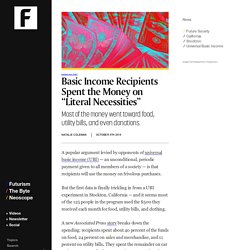
But the first data is finally trickling in from a UBI experiment in Stockton, California — and it seems most of the 125 people in the program used the $500 they received each month for food, utility bills, and clothing. A new Associated Press story breaks down the spending: recipients spent about 40 percent of the funds on food, 24 percent on sales and merchandise, and 11 percent on utility bills.
They spent the remainder on car maintenance, medical expenses, insurance, education, self care, and even donations. One recipient, Zhona Everett, 48, told the AP that she and her husband — a truck driver — each earned barely $100 a day. The Invention of Money. When the Venetian merchant Marco Polo got to China, in the latter part of the thirteenth century, he saw many wonders—gunpowder and coal and eyeglasses and porcelain.
One of the things that astonished him most, however, was a new invention, implemented by Kublai Khan, a grandson of the great conqueror Genghis. It was paper money, introduced by Kublai in 1260. Polo could hardly believe his eyes when he saw what the Khan was doing: He makes his money after this fashion. The Prepaid Economy: African Edition — Mobile Money and the Informal Economy: A Paradigm... If capitalism is broken, maybe it’s fixable - Open Future. The new left economics: how a network of thinkers is transforming capitalism. For almost half a century, something vital has been missing from leftwing politics in western countries.
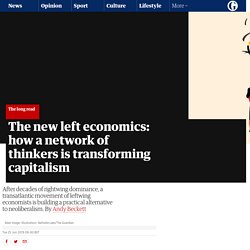
Since the 70s, the left has changed how many people think about prejudice, personal identity and freedom. It has exposed capitalism’s cruelties. It has sometimes won elections, and sometimes governed effectively afterwards. But it has not been able to change fundamentally how wealth and work function in society – or even provide a compelling vision of how that might be done. The left, in short, has not had an economic policy. Instead, the right has had one. Is Facebook's Libra currency a case of corporate megalomania? What is Facebook’s new Libra digital currency?
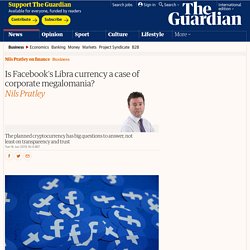
A way to stop money-transfer companies exploiting the world’s poor by skimming off vast fees in cross-border transactions? Or an exercise in corporate megalomania that will involve persuading us to accept “a new global currency”? Beyond Budgeting Institute - Enabling business agility. Neoliberalism must be pronounced dead and buried. Where next?
What kind of economic system is most conducive to human wellbeing?

That question has come to define the current era, because, after 40 years of neoliberalism in the United States and other advanced economies, we know what doesn’t work. The neoliberal experiment – lower taxes on the rich, deregulation of labour and product markets, financialisation, and globalisation – has been a spectacular failure. Growth is lower than it was in the quarter-century after the second world war, and most of it has accrued to the very top of the income scale. After decades of stagnant or even falling incomes for those below them, neoliberalism must be pronounced dead and buried. Dare to declare capitalism dead – before it takes us all down with it. For most of my adult life I’ve railed against “corporate capitalism”, “consumer capitalism” and “crony capitalism”. It took me a long time to see that the problem is not the adjective but the noun. While some people have rejected capitalism gladly and swiftly, I’ve done so slowly and reluctantly.
Part of the reason was that I could see no clear alternative: unlike some anti-capitalists, I have never been an enthusiast for state communism. I was also inhibited by its religious status. To say “capitalism is failing” in the 21st century is like saying “God is dead” in the 19th: it is secular blasphemy. On the Politics of Basic Income. In the course of preparing some brief comments on the Universal Basic Income for another site, I decided to write up my attempt to clarify some of the politics behind the current debates about UBI as a demand and as a policy.
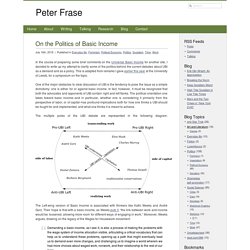
This is adapted from remarks I gave earlier this year at the University of Leeds, for a symposium on the topic. Sikkim says it will become first state to roll out Universal Basic Income. Sikkim will be the first state to roll out Universal Basic Income (UBI) and has started the process to introduce the unconditional direct cash transfer scheme.
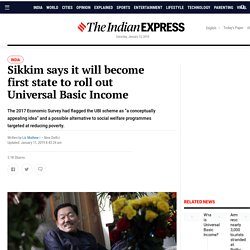
Sikkim’s ruling party, the Sikkim Democratic Front (SDF), has decided to include UBI in its manifesto ahead of the Assembly election in 2019 and aims to implement the scheme by 2022. The 2017 Economic Survey had flagged the UBI scheme as “a conceptually appealing idea” and a possible alternative to social welfare programmes targeted at reducing poverty. Speaking to The Indian Express, Prem Das Rai, SDF MP in the Lok Sabha, said: “Our party and Chief Minister Pawan Chamling, who is the longest serving Chief Minister, are committed to bringing in Universal Basic Income. This, we will do three years of coming back to power in the state.” Doing the Doughnut at the G20? This weekend the G20 are meeting in Argentina, with the aim (they say) of ‘building consensus for fair and sustainable development’. Since they collectively generate 85% of global GDP, whether they do or don’t transform their economies will profoundly affect us all.
So how close to the Doughnut’s safe and just space are the G20? Here’s one way of assessing it, using the pioneering national doughnut analysis by Dan O’Neill, Andrew Fanning, Julia Steinberger and Will Lamb at the University of Leeds. Using the best-available, internationally comparable data, they scaled the global concept of the Doughnut down to the national level for over 150 countries (only including those for which there were sufficient data – as a result, Saudi Arabia is unfortunately missing from this G20 analysis. Scientists Warn the UN of Capitalism’s Imminent Demise.
Capitalism as we know it is over.
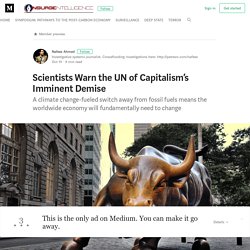
So suggests a new report commissioned by a group of scientists appointed by the UN Secretary-General. The main reason? We’re transitioning rapidly to a radically different global economy, due to our increasingly unsustainable exploitation of the planet’s environmental resources. Climate change and species extinctions are accelerating even as societies are experiencing rising inequality, unemployment, slow economic growth, rising debt levels, and impotent governments.
How to Destroy Neoliberalism: Kill 'Homo Economicus' By Nick Hanauer This piece is adapted from a speech delivered September 30th at MIT, where Nick Hanauer won the 2018 Harvard and MIT Humanist of the Year award.
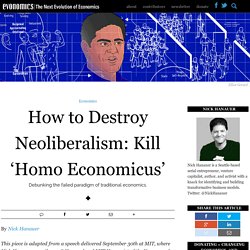
Read more about the award, as well as Democracy Journal’s editor Michael Tomasky’s Q&A with Hanauer, here. I’m thrilled to receive this award from such distinguished hosts—but I won’t lie: When I was told I would be honored as the “Humanist” of the year, the first thing I did was double-check the definition to make sure it was a good thing. And here I am. So—thanks! As a person who comes from three generations of non-practicing, non-religious Jews, what you “are” can be somewhat confusing. On the Politics of Basic Income. Ontario Ends Its Three-Year Basic Income Trial After Just One Year. THAT WAS FAST. 4,000 people in Ontario just lost what they thought was a guaranteed source of income for the next two years.
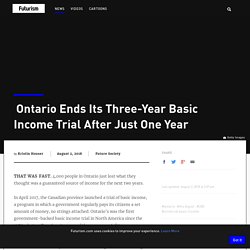
In April 2017, the Canadian province launched a trial of basic income, a program in which a government regularly pays its citizens a set amount of money, no strings attached. Alibaba versus Tencent: who will win? I bet you were wondering why I hadn’t written an Ant update recently. Well, I thought it was getting too much … but then I just arrived in Hong Kong and the hotel has kindly given me a copy of Fortune magazine with the headline cover page talking about the battle between Alibaba and Tencent. It’s a fascinating read, with which I am very familiar, and analyses the cultural differences between the two companies. It misses some key areas, such as the global footprint of Ant Financial through partnership in every geography, and focuses more on the Chinese domestic play, but it’s definitely worth a read if you’re interested in what’s happening … and you should be, as the markets that will change tomorrow’s world are those with scale: USA, China, India, Indonesia and more.
When you have over 200 million people living in a country, you can produce scaled products fast. “A New Social Contract” Re-envisions an Inclusive Democracy. A California City Is Gearing Up To Test Universal Basic Income. For years, the citizens of Stockton, California, have faced rampant unemployment, poverty, and hardship. For some, a new experiment could change that. In the coming months, mayor Michael Tubbs plans to launch a universal basic income trial that will — without any conditions or work requirements — give monthly payments to about 100 families over the next two years, according to the New York Times. With regular, no-strings-attached payments from the government, people might be able to go back to school or climb out of their student loan debt. The extra cash could turn into more time spent with family or the ability to make healthier meals — the idea is to let people improve their quality of life as much as possible.
ScotPound: digital currency for the common good. Digital innovation has opened up exciting possibilities for new kinds of money and exchange. As a clearly defined economic and physical area of 5.3 million people, with a strong national identity, and a devolved parliament, Scotland is perfectly placed to create a new digital currency and payment system. Such a scheme could stimulate local economies, create a level playing field for small businesses, and support social justice for all its citizens.
Bp energy outlook 2017 (1) The future of money (research report) What FinTech means to banks. The rebel bank, printing its own notes and buying back people's debts. First there were the banks. Will platforms replace governments? Untitled. I recently blogged about the Edelman Trust Barometer, which makes clear that technology firms are trusted the most and financial firms the least. The economics of our future world. Canadian province trials basic income for thousands of residents. Capitalism Is Not the Only Choice by Penn Loh.
Best Lawyers. For many years, banks have partnered with Fintech companies to offer online loans to consumers. Some of these bank partnerships have been challenged by consumer advocates through so-called “true lender” litigation in state and federal courts, by state regulators, and through criminal prosecutions. The latest on Apple Pay (#Money2020) Basic income isn’t just a nice idea. It's a birthright. Don’t Be Scared About The End Of Capitalism—Be Excited. The truth about Ant Financial ... - Chris Skinner's blog. Why I Quit Ordering From Uber-for-Food Start-Ups - The Atlantic. MoneyClassification. What makes DBS different? - Chris Skinner's blog.
Finally, a breakthrough alternative to growth economics – the doughnut. Capitalism's excesses belong in the dustbin of history. What's next is up to us. A New Oakland Museum Imagines a World Where Capitalism Is Dead. Are You Ready To Consider That Capitalism Is The Real Problem? Klarna is a great illustration of the financial marketplace - Chris Skinner's blog. Love the idea of a universal basic income? Be careful what you wish for. Economist. Hawaii Becomes the First State to Pass a Bill in Support of Universal Basic Income. Uk.businessinsider. A New Oakland Museum Imagines a World Where Capitalism Is Dead. Universal basic income scheme set for trials in Barcelona, Utrecht and Helsinki. The Power Couple Annihilating Credit Cards. Is the Gig Economy Working? Towards a regenerative economy – Dr. Daniel Christian Wahl – Medium. A world without money - Chris Skinner's blog.
5 Business Models That Are Driving The Circular Economy. Finally, a breakthrough alternative to growth economics – the doughnut. A disruptive innovation appears - Chris Skinner's blog. The largest payments company in the world that most people have never heard of - Chris Skinner's blog. Utopian thinking: the easy way to eradicate poverty. Universal basic income is becoming an urgent necessity. India's demonetisation - taking the bull by the horns - Chris Skinner's blog. Dutch city plans to pay citizens a ‘basic income’, and Greens say it could work in the UK. Did my predictions come true? - Chris Skinner's blog.
Finland trials basic income for unemployed. The unbankable banked - Chris Skinner's blog. Go Fintech or go home (and don't be Techfin) - Chris Skinner's blog. What do wealthy customers want? - Chris Skinner's blog. Reboot the bank's boardroom NOW! - Chris Skinner's blog. Look at financial inclusion for innovation - Chris Skinner's blog. A glimpse of the future, part two - 70 is the new 30 - Chris Skinner's blog. #Brexit: a positive force for change - Chris Skinner's blog. Who owns the customer in the internet of things? - Chris Skinner's blog. Joseph Stiglitz proposes co-op models as an alternative to trickle-down economics - Co-operative News. Where machines could replace humans. If you want to convince the bank to change, read this blog - Chris Skinner's blog. The 'Airbnb effect': is it real, and what is it doing to a city like Amsterdam? Core systems should have built-in obsolescence - Chris Skinner's blog.
The Radical Remaking of Economics. Explicit cookie consent. It’s time to junk the flawed economic models that make the world a dangerous place. A New Economic System for a World in Rapid Disintegration. From zero to seventy (billion) Big Bang II: After Brexit, what’s next for the City of London? Radical new economic system will emerge from collapse of capitalism. Is the Library of Things an answer to our peak stuff problem? Clean energy won’t save us – only a new economic system can. 40 Futurists Offer Advice to Your Child About Future Work : Leading Thought. Uberisation and the dangers of neo-serfdom. The end of capitalism has begun. The Monetary Authority of Singapore: keeping up with the Bank - Chris Skinner's blog. The Bank of England: taking the lead in #FinTech - Chris Skinner's blog.
Are We Shifting to a New Post-Capitalist Value Regime? Hotels vs. Airbnb: Let the Battle Begin. US Federal Reserve 'Might Legitimately Consider' Public Money Creation. Bank of England: UK banks to lose their status as ‘gatekeepers’ to the payment system. The end of capitalism has begun. The Future of Work – A journey to 2022. Management Today. Silicon Valley's Audacious Plan to Create a New Stock Exchange.